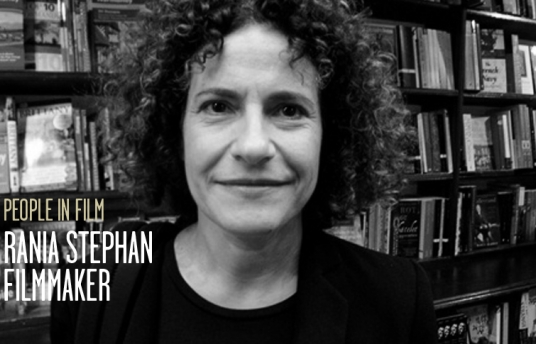أهل السينما: رانيا اسطفان
31 يناير 2012

ولدت رانيا اسطفان في بيروت، ونالت شهادتها في الدراسات السينمائية من جامعة لاتروب في أستراليا، وشهادة أخرى من جامعة باريس الثامنة. عملت كمساعد مخرج أول، مصوّرة ومونتيرة مع صناع أفلام معروفين كسيمون بيتون وإيليا سليمان. من أفلامها الأخيرة “دخان على الماء” و “7 X الهرمل” (2007) و“لبنان/حرب” (2006). أما فيلمها الأخير “الاختفاءات الثلاثة لسعاد حسني“، فيروي سيرة حياة الممثلة المصرية سعاد حسني، التي توفيت عام 2001. وقد فاز بجائزة أفضل مخرج أفلام وثائقية عربي في مهرجان الدوحة ترايبكا السينمائي 2011.
مؤسسة الدوحة للأفلام: فيلمك الذي يتناول سعاد حسني، قائم فقط على المواد المؤرشفة من أفلامها. لماذا اخترتِ أن توثقي حياتها بهذه الطريقة؟ ولماذا سعاد حسني؟
اسطفان: لطالما كنت مهتمة بأعمال سعاد حسني، منذ أن كنت طالبة في الدراسات السينمائية. حين توفيت عام 2001، فوجئت كالكثيرين في العالم العربي. وأردت أن أكرّم موهبتها. كانت الشخص الوحيد الذي كنت أرغب بلقائه، وبعد أن توارت عن الأنظار، كان أفضل ما يمكن عمله هو مشاهدة أعمالها. لقد كانت مخلوقةً سينمائيةً، مثلت في 82 فيلماً. وقد أنبأني حدسي أن صورها قادرة على كشف معالم جوهرية في شخصيتها.
مؤسسة الدوحة للأفلام: لماذا ثلاثة اختفاءات؟
اسطفان: لقد بنيت الفيلم على اختفاءات ثلاثة حبكتها في سياق القصة: اختفاء سعاد الممثلة، وما مثّلته في السينما المصرية على مدى ثلاثة عقود، واختفاء أفلام الفي أتش أس، التي عليها معظم أفلامها.
مؤسسة الدوحة للأفلام:هناك الكثير من الجدل الذي يلف موت سعاد حسني في لندن. هناك من يقول إنها انتحرت، وآخرون يقولون إنها قُتلت. ما هو رأيك؟
اسطفان: يبدو مستحيلاً على الكثير من العرب أن يتخيلوا أن شخصيةً كسعاد حسني- بكل جمالها وموهبتها- قادرة على الانتحار. أردد دائماً أن فيلمي يتناول حياتها وأعمالها، وليس موتها. وفيلمي لا يبت في الموضوع. يبقى السؤال معلقاً.
مؤسسة الدوحة للأفلام: الاستعانة بأفلام الأبيض والأسود لتوثيق حياة سعاد حسني، تبدو أنها كانت مهمة صعبة. كم من الوقت استغرقتِ في جمع المواد الأرشيفية، وأين عثرتِ عليها؟
اسطفان: وجدت كل سجلها السينمائي تقريباً في محل لبيع الأفلام في القاهرة. وكلها كانت أشرطة فيديو في أتش أس رخيصة الثمن. هناك ثلاثة أفلام ناقصة. فقد أنتجتها شركات أجنبية ويبدو أنها ضاعت. كما استغرقت وقتاً لإنهاء فيلمي، لأن إقناع المؤسسات الممولة بالانفاق على فيلم بهذه الغرابة، تطلب وقتاً.
مؤسسة الدوحة للأفلام: كيف كانت حالة هذه الأفلام؟
اسطفان: الكثير من أشرطة الفي أتش أس كانت تحمل نفس العلامات، كالألوان المتغيرة والخدوش. لكن تلك المواد التي كنت أبحث فيها سرعان ما تحولت إلى مواد الفيلم نفسه. فهو عبارة عن ممثلة تتذكر حياتها وأعمالها.
مؤسسة الدوحة للأفلام: هل عملية أرشفة الأفلام العربية تبعث على القلق؟
اسطفان: ليست هناك أية عملية أرشفة احترافية للأفلام في العالم العربي. حتى مصر نفسها، الغنية بالتاريخ السينمائي، لا تمتلك أرشيفاً لسينماها الخاصة. يجب أن نقلق كثيراً حيال هذا الأمر، لأن هذا الإهمال يؤدي إلى نتائج مأساوية وضياع تاريخنا.
مؤسسة الدوحة للأفلام: ماذا علمكِ هذا الفيلم عن سعاد حسني؟
اسطفان: بعد أن شاهدت جميع أعمالها تقريباً، أشعر بأني صرت أعرفها بطريقة أو بأخرى، على الرغم من أني لم ألتقيها في حياتي. إنها كفرد من أفراد عائلتي الآن. إنها تؤثر بي بشكل غريب.
مؤسسة الدوحة للأفلام: لقد عملتِ على منتجة وإخراج الفيلم. أين تجدين نفسك أكثر؟
اسطفان: أنا صانعة أفلام، غالباً ما أقوم بإخراج ومنتجة أفلامي، لأني أفهم العالم من حولي بهذه الطريقة. طريقة تفكيري تتبع طريقة عملي. أحياناً أقوم بمنتجة أفلام أخرى كي أكسب عيشي، لكني لا أشعر بأني مونتيرة حقيقية… ربما لأني أفكر كمخرجة.
مؤسسة الدوحة للأفلام: هل تعملين على مشاريع حالياً؟
اسطفان: أكتب فيلماً خيالياً، سيحتوي على عناصر وثائقية. أحب أن أستخدم أنواعاً متعددة من أشكال الصورة والمصادر في بناء عملي.
مؤسسة الدوحة للأفلام: ما هو الفيلم أو المخرج الذي أثر بكِ؟
اسطفان: جان لوك غودار. إنه الأستاذ. إنه كالساموراي العجوز الذي نتعلم منه الفن، دائماً ما أعود إليه. لكني تأثرت أيضاً بصناع أفلام آخرين، من مختلف الأزمنة ودول العالم. أنا متأثرة أيضاً بالفنانين الذي يستخدمون الصور في أعمالهم، ويبهرني المصورون.
مؤسسة الدوحة للأفلام: أخبرينا عن أغرب لحظة في حياتك المهنية؟
اسطفان: الأربعاء 26 يناير، 2011. كان عيد ميلاد سعاد حسني، واليوم الثاني للثورة المصرية، كما أني أنهيت فيه منتجة فيلمي. كان أمراً رائعاً.